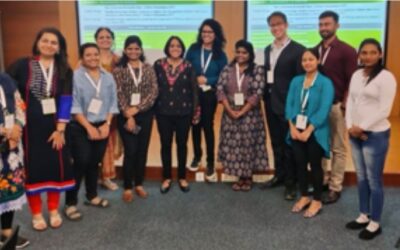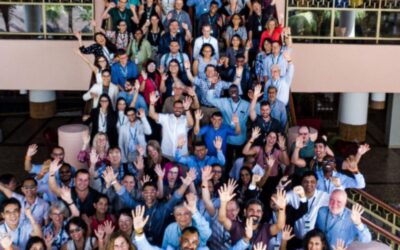Mutually Beneficial Collab
The NIH, Infectious Diseases, and RePORT International: A Long-standing, Mutually Beneficial Collaboration
The National Institute of Allergy and Infectious Diseases (NIAID) under the US-based National Institutes of Health (NIH) had a long history of funding tuberculosis (TB) research globally. It is the main funder of RePORT International with a close relationship for collaborative thinking to solve the issues around TB transmission, progression, and detection. This month, we are featuring the NIAID team who graciously answered our questions.
NIH Team left to right: Peter Kim, Nicole Espy, and Fatima Jones
Describe how RePORT International developed within NIH
RePORT International was first established in 2011 following discussions with global funding partners around the need to advance TB biomarker and other TB and TB/HIV research priorities in high-burden settings, using a collaborative bilateral funding mechanism. RePORT India was the first realization of this potential and resulted from a collaboration between the India Department of Biotechnology (DBT), the Indian Council Medical Research (ICMR), and the U.S. National Institutes of Health (NIH), under the auspices of the Indo-US Vaccine Action Program (VAP). Further discussions and collaborations with the Brazilian Ministry of Health (MOH) and Department of Science and Technology (DECIT), and the South Africa Medical Research Council (SAMRC) followed to establish the RePORT Brazil and RePORT South Africa networks, respectively. Over the years, the network has continued to expand to include collaborations with other partner countries including China, the Philippines, Indonesia, South Korea, and most recently, Uganda.
What is the background of each NIAID team member and what brought them to working in the field of TB? How has each of your skills/experiences contributed to providing support to RePORT International?
The NIAID RePORT team has evolved significantly over the years. In addition to the Division of AIDS (DAIDS) leadership team, which includes Dr. Peter Kim, Dr. Fatima Jones, and Dr. Nicole Espy, many others have and continue to contribute to the success of the program. These include but are not limited to Dr. Sudha Srinivasan, Dr. Elizabeth Church, Nandita Chopra, Dr. Swetha Aggarwal (US-EMBASSY India), Dr. Annie Bridwell, Kathleen Muldoon, and other collaborators in the Division of Intramural Research (DIR), Dr. Aaron Neal, who serves as the NIAID Country Lead for Indonesia, and the Office of Global Research (OGR), Dr. Joyelle Dominque, William Rosa, Lucy Ruderman, and many countless others. This collaborative team brings not only expertise in TB and TB/HIV science, epidemiology, global health, and clinical research, but also a passion for ending the TB and HIV epidemic and improving the lives of people impacted by these diseases globally.
What is unique about the RePORT Consortium compared to other TB research networks?
RePORT International is one of the largest observational cohorts of people living with TB and their household contacts globally and represents a unique collaborative funding platform to advance regional and global scientific investments and research priorities in TB and TB/HIV science. Research priorities are established in collaboration with in-country funders and partners, with support from NIAID. The large, federated network of researchers and research sites are coordinated under the umbrella of the RePORT International Coordination Center (RICC), operated through Rutgers, which allows for the independence of each regional network to focus on local priorities, while facilitating cross-networks collaborations to address emerging global needs.
What do you see as challenges for TB research in general?
DAIDS is focused on the prevention and treatment of HIV and comorbidities, and TB remains the leading cause of death of people living with HIV (PWH). Key challenges in TB research for which the RePORT network is well positioned to address include the identification and validation of host-response biomarkers for TB disease progression; improved diagnostics and treatment strategies for pediatric TB, extrapulmonary TB, and people living with TB/HIV; deployment of novel technologies and prevention strategies including vaccines and long-acting formations; advancing the development of better, safer, and shortened regimens for the treatment of drug sensitive and drug resistant TB; and improved strategies for the management of post-TB lung disease and other co-morbidities, in particular among PWH.
Where do you see the scope of RePORT International in the future? Will it change or need to change?
The vision is for RePORT to continue to expand while building operational flexibility and research capacity to ensure that the network can rapidly respond to emerging regional needs and global priorities in TB and TB/HIV science. This includes strengthening the capacity of regional networks and addressing GDPR and other global challenges to improve equitable access to data and specimens which is necessary to enhance and facilitate more robust regional and global research partnerships and collaborations. Additionally, we envision continued engagement with other global partners, national TB programs, scientists, clinical trial networks, and strategic partnerships with commercial, community-based, and academic institutions to expand the reach of the network and advance the mission to improve the lives of people living with TB and TB/HIV through research in biomarkers, diagnostics, and treatment and prevention strategies.
How does RePORT International align with NIH's broader goals in global health and TB research?
NIH’s strategic objectives, as outlined in the NIAID TB Strategic Plan include an emphasis on improving the fundamental knowledge of TB and advancing research in diagnostics, vaccines, and therapeutics for TB. The aims of RePORT International are reflected in these priorities. RePORT International serves as an important platform for researchers to answer questions related to TB infection and disease and advance the scientific evidence needed to develop and improve diagnostic, preventive, and treatment strategies for TB. Investments in the network will ensure that clinicians, laboratorians, and staff will be at the forefront of innovation. The NIAID TB Strategic Plan also calls for collaborative science to address these priorities. This is the essence of the RePORT consortium. The success of collaborations between investigators in each country program and cross-consortium in publishing and training demonstrates the impact of investigating common research questions and building capacity to advance the science of TB.
What opportunities do you see for further collaboration between RePORT International and other NIH-funded initiatives?
There are many opportunities for further collaboration with the RePORT network and other NIH-sponsored programs and initiatives. These include the recently launched Facilitating Accelerated Science and Translation for TB regimen develop (FAST-TB) program, established in partnership with CRDF Global to serve as a global collaborative platform to facilitate and accelerate the development and implementation of novel TB regimens in low-resource settings. Through FAST-TB, RePORT and other global TB partners are currently represented as part of the Global Forum to Accelerate Simpler TB treatments (GoFAST), which aims to advance research in diagnostics, biomarkers, and drug resistance to facilitate the implementation of novel and shorter TB treatment regimens. Other ongoing NIH/NIAID partnerships and collaborations include the Feasibility of Novel Diagnostics for TB in Endemic Countries (FEND for TB), Tuberculosis Research Units Network (TBRU), and the International Epidemiology Database to Evaluate AIDS (IeDEA) Tuberculosis Sentinel Research Network (TB-SRN).
What's new
JHU Spotlight
Johns hopkins university SpotlightJohns Hopkins University (JHU) - A Foundational Member of RePORT International Johns Hopkins University (JHU) has been a partner in RePORT International’s efforts since the network’s inception in 2014, having served as a foundational...
Cross-Consortium Grant Results
Cross-Consortium Grant ResultsRePORT International Coordinating Center (RICC) Cross-Consortium Grant ResultsWe are pleased to announce the awardees of the RICC Cross-Consortium grant competition. A special thanks to the applicants and external reviewers of each...
International Annual Meet 2024
international annual meet 2024RePORT International Annual Meeting 2024, August 21-23, SalvadorThe RePORT International Annual Meeting 2024 was held from August 21-23 in Salvador, Brazil, bringing together approximately 120 participants from our global network. This...




